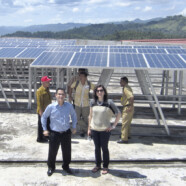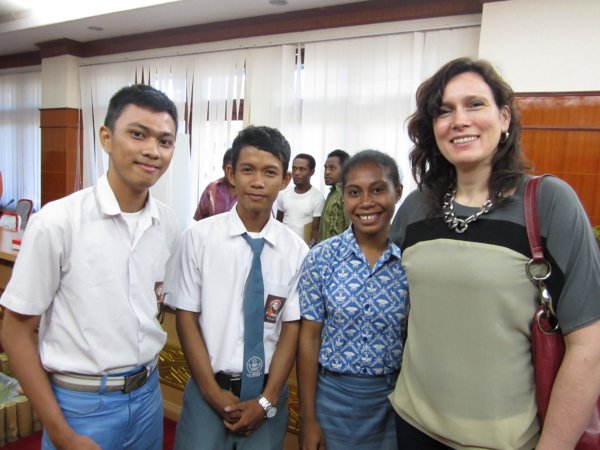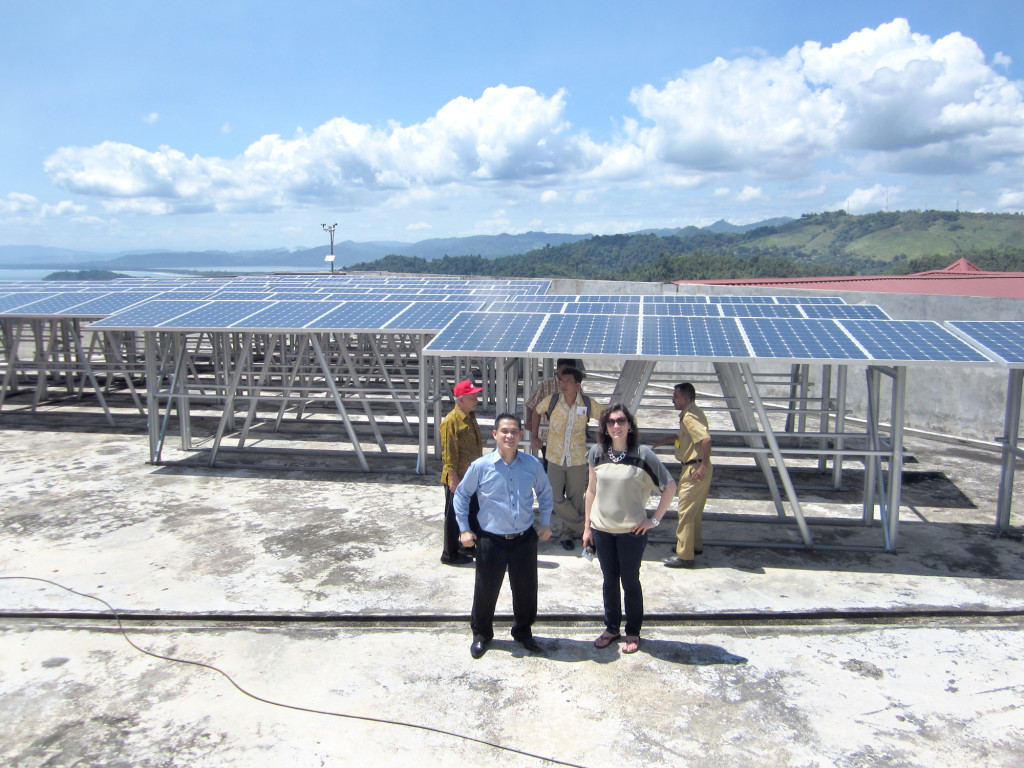Solar Energy in Indonesia
University of Twente Involved in Solar Energy in Indonesia
Increasing prosperity and a rising demand for energy in Indonesia: solar energy offers an answer
Partly thanks to the work of Angele Reinders of the University of Twente, a new system for photovoltaic (PV) solar energy has been developed on the Indonesian island of Papua. Due to Indonesia’s enormous growth and rising prosperity, the demand for electricity is also increasing. Solar energy provides an answer. During the past two years, the UT has collaborated with the Bandung Institute of Technology (ITB), Cenderawasih University, the World Wildlife Fund and various local installers in order to develop the PV system on the island. Training courses on solar energy were also set up.
“Till three years ago, Indonesia had hardly any experience with solar energy systems that were connected to the grid,” says Reinders. The senior lecturer from the department of Design, Production and Management (Faculty of Engineering Technology) and expert in the field of solar energy saw with her own eyes how the energy supply was organized in the country. Together with UT PhD candidate Hans Veldhuis, she spent some time in the city of Jayapura. “Due to the growing demand for capacity, the local electricity network suffers from many blackouts andnoisy and polluting diesel generators dominate the street view. In remote areas of Papua, the province on the island of New Guinea where I was, diesel was flown in for generators. The local population sometimes used solar home systems, but these were mainly designed to supply electricity to only one household. We have now reached the point where a feed-in tariff of 25 to 30 dollar cents per generated kWh is being paid for generated solar power. This is a payment for the supply of solar power to the grid. Such an amount makes it considerably more attractive to connect such a PV system to the grid. This is due the fact that you can earn money after a payback period of about eight years: each kWh equals about 25 cents.”
Enormous savings on diesel and coal
Reinders received 700,000 euros from the Netherlands Enterprise Agency to develop grid-connected PV systems in Indonesia. The programme focuses on education, knowledge transfer, networking and research. So far, the results have been very positive. “The system produces about 50,000 kWh of electricity per year. This equals a saving of 5,000 litres of diesel and 11,000 kilos of coal per year. The CO2 emission reduction is also gigantic,” said the head of Jayapura Environmental Agency in the Jakarta Post newspaper. The project drew a lot of attention in the Indonesian media.
“A pilot plant has been installed in Papua, we have provided training courses in the field of solar energy, and there is now a monitoring system for the PV system,” continues Reinders. “Using the solar energy system, the local town hall is now largely self-sufficient regarding its energy needs. At the ITB institute, ten professors are now working on solar energy and more Indonesian engineers are being trained.”
Indonesian students
A number of these engineers are now following the double degree programme of the master’s in Sustainable Energy Technology, which has been set up by Prof. Theo van der Meer (Faculty of Engineering Technology) of the University of Twente. Reinders: “Moreover, an Indonesian PhD candidate will join the department of Design, Production and Management and focus on the stimulation of solar energy in her country. So although the project has officially been completed, we certainly will continue to work on this topic.”
About Angele Reinders
Angele Reinders executes research into the application of renewable energy in products, households and buildings. She uses a design-driven approach for which reason many of her projects are ‘high tech with a human touch’. Examples include Virtue of Blue, a solar-powered chandelier that she developed together with Dutch design studio DeMakersVan, innovative designs for solar-powered boats in Friesland and the improvement of energy products in smart energy homes. At the University of Twente, Reinders is also involved in the realization of renewable energy projects on the energy-neutral campus by means of the PV test bench on the Citadel building and the PV system that has been installed on the roof of the Horst building. In addition to her appointment at the University of Twente, she also holds a position of part-time professor at the Faculty of Industrial Design at Delft University of Technology.
Source: University of Twente / Jochem Vreeman
==============================================
Belanda dan Indonesia bergabung untuk sistem energi surya baru di Papua
Energi surya memberikan jawaban atas meningkatnya kebutuhan listrik yang cepat akibat pertumbuhan ekonomi dan meningkatnya kemakmuran di Indonesia. Berkat inisiatif Belanda – Indonesia yang dipimpin oleh Dr Angele Reinders dari Universitas Twente sistem baru untuk photovoltaic ( PV ) energi surya telah dikembangkan di Papua.
Keahlian dari Belanda
Angele Reinders, profesor Tehnik Desain Industri dari Universitas Twente dan ahli di bidang energi surya menerima hibah sebesar 700.000 euro dari pemerintah Belanda untuk mengembangkan sistem PV grid-connected di Indonesia. Program ini memberikan fokus pada pendidikan, transfer pengetahuan, jaringan dan penelitian. Selama dua tahun terakhir Universitas Twente, Institut Teknologi Bandung ( ITB ), Universitas Cenderawasih, World Wildlife Fund dan berbagai installer lokal telah bekerjasama untuk mengembangkan sistem PV di Papua. Pelatihan pada energi surya juga dibentuk.
Perlu solusi berkelanjutan
“Sampai tiga tahun lalu, Indonesia memiliki hampir tidak ada pengalaman dengan sistem energi surya yang terhubung ke grid” ujar Reinders, dia melihat dengan mata kepalanya sendiri bagaimana pasokan energi ini dikelola ketika ia menghabiskan waktu di kota Jayapura.” Karena peningkatan permintaan untuk kapasitas, jaringan listrik lokal menderita banyak pemadaman dan generator diesel yang bising dan mengeluarkan polusi mendominasi tampilan jalan. Di daerah terpencil Papua, solar diterbangkan untuk generator.
Hasil pertama yang baik
Sejauh ini, hasilnya sudah sangat positif . Sistem ini menghasilkan sekitar 50.000 kWh listrik per tahun. Ini sama dengan penghematan 5.000 liter solar dan 11.000 kilo batu bara per tahun. ” Sebuah pilot plant telah diinstal di Papua, kami telah menyediakan pelatihan di bidang energi surya, dan sekarang ada sistem monitoring untuk sistem PV.” lanjut Reinders . “Menggunakan sistem energi surya, sekarang balai kota setempat sebagian besar mandiri mengenai kebutuhan energi ” .
Transfer Pengetahuan
Meskipun proyek ini secara resmi telah selesai, universitas yang terlibat akan terus bekerja pada topik ini. Di ITB, sepuluh profesor sedang melakukan penelitian tentang energi surya dan lebih banyak insinyur Indonesia sedang dilatih. Sejumlah insinyur ini mengambil program Master Teknologi Energi Berkelanjutan, program double degree antara Twente dan ITB. Selain itu, kandidat PhD Indonesia akan bergabung dengan departemen Desain, Produksi dan Manajemen di Twente dan fokus pada stimulasi energi surya di Indonesia.
Kerjasama pendidikan tinggi
Mendengar hasil dan pelaksanaan yang berkelanjutan dari proyek ini, Mervin Bakker, Direktur Netherlands Education Support Office ( Nuffic Neso Indonesia ) di Jakarta mengatakan, “Saya sangat senang mengetahui universitas Twente berhasil berkolaborasi baik dengan mitra akademik dan non – akademik dari Indonesia dalam sebuah proyek yang memiliki dampak positif langsung bagi masyarakat . Bagi saya itu adalah contoh yang bagus dari hasil yang dapat dicapai melalui kerja sama pendidikan tinggi antara Indonesia dan Belanda.”
Source: nesoindonesia.or.id




